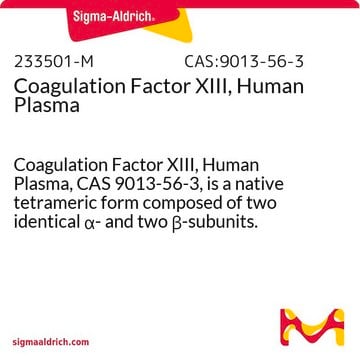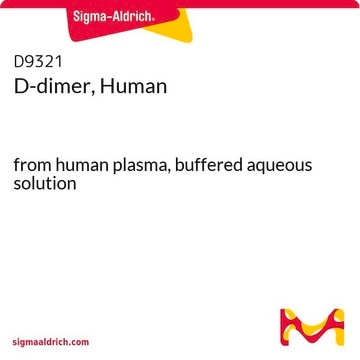Recommended Products
biological source
human plasma
Quality Level
form
powder
technique(s)
indirect ELISA: suitable
SMILES string
N(CC(=O)NC)C(=O)CN
InChI
1S/C5H11N3O2/c1-7-5(10)3-8-4(9)2-6/h2-3,6H2,1H3,(H,7,10)(H,8,9)
InChI key
BWGVNKXGVNDBDI-UHFFFAOYSA-N
General description
Application
- for in vitro cleavage of fibrinogen and fibrin
- as a reference for true component analysis (TCA) and principal component analysis (PCA) of Raman spectra
- as a reference in Raman spectroscopy to study the binding mechanisms and the binding efficiency of the different polyoxometalates (POMs)
Biochem/physiol Actions
Preparation Note
Disclaimer
Storage Class Code
11 - Combustible Solids
WGK
WGK 3
Flash Point(F)
Not applicable
Flash Point(C)
Not applicable
Choose from one of the most recent versions:
Certificates of Analysis (COA)
Don't see the Right Version?
If you require a particular version, you can look up a specific certificate by the Lot or Batch number.
Already Own This Product?
Find documentation for the products that you have recently purchased in the Document Library.
Customers Also Viewed
Articles
Cell based angiogenesis assays to analyze new blood vessel formation for applications of cancer research, tissue regeneration and vascular biology.
Highlighting existing and novel fabrication methods for both, solid and hydrogel-based scaffold for tissue engineering applications.
Hydrogel-based biomaterials for cell delivery and tissue regeneration applications are discussed.
Hydrogel-based biomaterials for cell delivery and tissue regeneration applications are discussed.
Our team of scientists has experience in all areas of research including Life Science, Material Science, Chemical Synthesis, Chromatography, Analytical and many others.
Contact Technical Service









